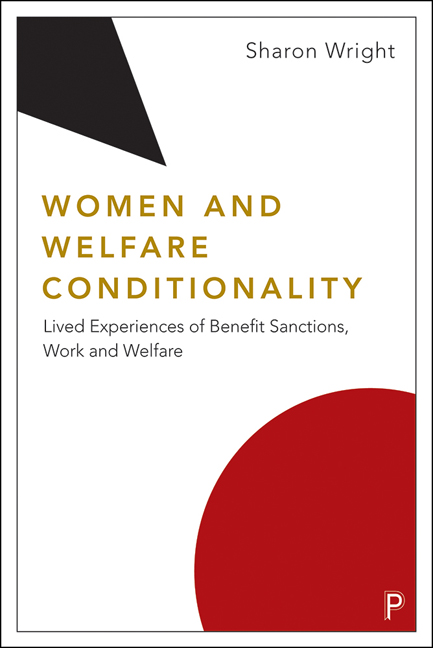Book contents
- Frontmatter
- Contents
- List of figure, tables and charts
- List of abbreviations
- Acknowledgements
- one What does work-based welfare reform mean for women?
- two Re-theorising conditional welfare as gendered lived experience and street-level practice
- three Policy context: the hidden gendered impacts of conditional welfare reforms
- four Rewriting retirement as ‘work experience’: older women’s gendered encounters with the work ethic
- five Crushing conditionality: women living through heavily enforced work-related conditionality
- six In the shadow of sanctions: disciplining women and children for violating male-defined work norms
- seven Conclusions
- Appendix 1 The Welfare Conditionality study
- Appendix 2 Sanctions overviews
- Notes
- References
- Index
seven - Conclusions
Published online by Cambridge University Press: 27 March 2024
- Frontmatter
- Contents
- List of figure, tables and charts
- List of abbreviations
- Acknowledgements
- one What does work-based welfare reform mean for women?
- two Re-theorising conditional welfare as gendered lived experience and street-level practice
- three Policy context: the hidden gendered impacts of conditional welfare reforms
- four Rewriting retirement as ‘work experience’: older women’s gendered encounters with the work ethic
- five Crushing conditionality: women living through heavily enforced work-related conditionality
- six In the shadow of sanctions: disciplining women and children for violating male-defined work norms
- seven Conclusions
- Appendix 1 The Welfare Conditionality study
- Appendix 2 Sanctions overviews
- Notes
- References
- Index
Summary
Introduction
This book reveals the hidden male subtext of punitive UK welfare conditionality for working-age benefit claimants. It begins, as Dorothy Smith suggests, by viewing the social security system from the perspective of women whose lives are shaped by it every day. This creates a ‘way of seeing’ that is grounded in ‘where we actually live’ (Smith, 1987, 13). From this position the underlying gendered ‘relations and powers of the world we live in become visible from the sites of people’s actual experience’ (Smith, 1987, 165). For the 138 women claiming working-age benefits who took part in the Welfare Conditionality study between 2014 and 2018, welfare reforms, in a range of guises, had highly gendered impacts. The seemingly neutral design of Universal Credit, Jobseeker’s Allowance and Employment and Support Allowance policies are rooted in ‘relations of ruling [that] have a strongly gendered character’ (Smith, 1987, 165). Multiple layers of texts reveal the power relations of work and welfare. ‘Male subtexts’ within social security law, guidance documents and policy instruments have, for women, rewritten the parameters of paid work and unpaid caring. This textual mediation of women’s lives is ‘curious in its capacity to reproduce its order in the same way in an infinite variety of actual local contexts’ (Smith, 1990a, 2). Conditional welfare reforms, involving harsh punitive sanctions, are constructed in political discourses, policy design and practice norms as if women were unhampered by intersectional labour market disadvantages that combine gender, race, disability, age and class penalties to constrain employment opportunities, restrict pay and impede retention and advancement. Women are subordinated to a false version of their reality, which they must contort themselves and their intersubjective and interconnected lives to fit. Failure to fit is punished severely by potentially life-changing sanctions.
Despite the global rise of precarious working conditions (Standing, 2009), 21st-century social security reasserts an outdated full-time standard model of paid work and extends it far beyond the traditional targets of intervention – unemployed people. Disabled women and lone parents are required by default, on threat of sanctions, to comply with the same intensive 35-hour-per-week job-search expectations as unemployed people.
- Type
- Chapter
- Information
- Women and Welfare ConditionalityLived Experiences of Benefit Sanctions, Work and Welfare, pp. 117 - 131Publisher: Bristol University PressPrint publication year: 2023

